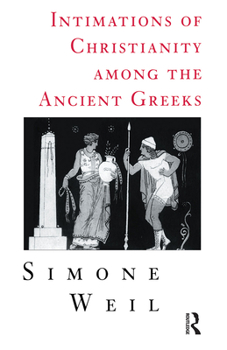Intimations of Christianity Among The Greeks
Select Format
Select Condition 
Book Overview
This book is a collection of Simone Weil's writings, which reflect her intellectual and spiritual concerns, on Greek thought. It discusses how precursors to Christian religious ideas can be found in ancient Greek mythology, literature and philosophy.
Format:Paperback
Language:English
ISBN:0415186625
ISBN13:9780415186629
Release Date:May 1998
Publisher:Routledge
Length:216 Pages
Weight:0.58 lbs.
Dimensions:0.8" x 5.1" x 7.8"
Customer Reviews
2 ratings
Imagination wins over reality
Published by Thriftbooks.com User , 16 years ago
Weil is most intelligible when examining the classical Greek plays and Homer's Iliad than in the rest of the texts. Even though the connections to Christianity are interesting and intriguing, it's rather the straightforwardness of her analysis of the works that make the book delightful to read and illustrative. The part on Plato's Republic, and on Pythagorean philosophy, are the most far-fetched and boring parts, obviously out of reach to the general reader anyway. The hypothesis about the origin of the poem The Iliad, first exposed by Thucydides, is very intriguing and beautifully put: "If one believes with Thucydides that 80 years after the destruction of Troy the Achaeans were in turn conquered, one may wonder whether these songs in which iron is so rarely mentioned, may not be the chants of a conquered people of whom perhaps some were exiled. Obliged to live and to die very far from the homeland, and like the Greeks before Troy, having, like the Troyans, lost their cities, they saw their likeness in the victors, who were their fathers, and also in the vanquished, whose sufferings resembled their own (...) they ... thus understand what never the defeated nor the victorious have ever understood, being blinded by one or the other state". The points in common between Christianity and the Greek classics are to be found deep, so deep that interpretations become blurry and may collude. That's the quality of classics. They allow, through their inscrutable depth, to be compared with other sublime texts of any other date and place. The author does more for the Greek texts by finding transcendent meaning there, than for the Biblical texts by only using them as the measuring stick against the Greek classics. All in all, due to the sheer power and depth of her statements, the book is well worth the read, if only for the parts mentioned above.
" . . . an intermediary between that which is mortal and that which is immortal . . ."
Published by Thriftbooks.com User , 17 years ago
Simone Weil was one of the transcendent geniuses of our time. The archetypal intellectual/activist - the clarity of her insight and the depth and weight of her oeuvre is remarkable, incredible for anyone - no less someone in their twenties and early thirties. A brilliant comet of a being, coursing luminously through the profanity and darkness of the mid-twentieth century to an early end, mercilessly, intensely engaged in the vortex of social change, yet seen by her contemporaries only from a distance - she died at a mere 34! This book is a compilation of Weil's papers on Greek Philosophy. The papers were published separately, are here collated to follow the development of her conception that many of the dominant themes in Greek philosophy, myth, and tragedy prefigure the major motifs in Christianity: divine love for humanity, universal love, altruistic sacrifice, humility, harmony, egalitarianism, etc. While numerous studies have examined the accepted fact that Greek thought, especially Platonism, formed the matrix for the emergence of Christianity, Weil's trenchant insights elevate the discourse and are of the greatest relevance to the human situation. The book begins with an examination of these ideas in Greek Myth and Tragedy. She then turns to Homer in her seminal essay, "The Iliad - Poem of Force". She then discusses the works surrounding the figure of Prometheus whom she perceives as Christ-like, proceeds to a discussion of major themes in Plato, primarily referencing the Republic and the Symposium. The book ends with an extended discussion of what Weil identifies as the Pythagorean Doctrine, and a brief historical sketch of Greek Science. Weil read the originals in Attic Greek, in which she was proficient. We know that she had contemplated a translation of the Iliad and perhaps more. As we near a half-century since her unfortunate death, Weil's prose has garnered universal regard. But, for the brief span of her maturity, the Nazis were ever at her heels, limiting her output. The works assembled in this slender volume represent the culmination of her thinking in the field of classical thought and piece together her signal vision which, in my opinion, is the first to accurately locate the meaning of the grand theme of eros in the project of Greek philosophy. She cites Plato, Symposium 196b: " . . . Love neither causes nor submits to injustice, be it among the gods or among men. For when suffering happens to him he does not suffer by force, for force cannot reach Love. And when he acts, he does not proceed by force, for each one consents to obey Love in everything." Love is thus diametrically opposed to force. Weil claims this dynamic to be: " . . . the very centre of all Greek thought, its perfectly pure and luminous core." Further: "Plato, in this passage, affirms as strongly as possible that that alone is just which is completely withdrawn from contact with might. Now there is but one faculty of






